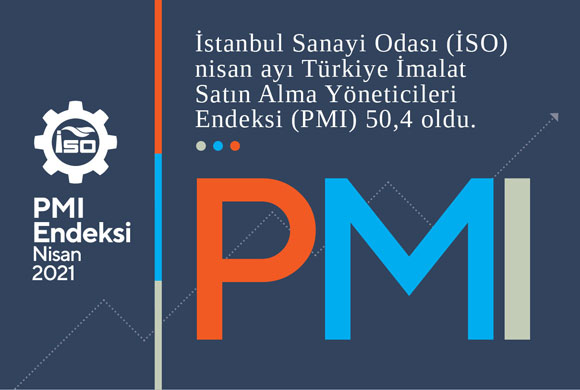News
April 2021 Report of ICI Türkiye Manufacturing PMI and Türkiye Sector PMI Released
- 03.05.2021
- News

Istanbul Chamber of Industry Türkiye Manufacturing PMI (Purchasing Managers’ Index), which is recognized as the fastest and reliable reference in manufacturing industry performance, the leading indicator of economic growth, dropped to 50.4 in April, pointing to a slight improvement in overall operating conditions. The performance of the sector recorded the most modest increase of the growth period, which has lasted for 11 months. Both output and new orders slowed down in April.
According to Istanbul Chamber of Industry Türkiye Sector PMI's for April, all of the ten sectors were negatively affected from the last wave of the Covid-19 outbreak, with a slowdown almost in overall output. Only the land and sea vehicles sector posted an increase in new orders, which experienced a large-scale loss of momentum. The continued increase of employee numbers in most of the sectors was the relatively positive development covered by the survey.
The April 2021 period of Istanbul Chamber of Industry (ISO) Türkiye Manufacturing PMI (Purchasing Managers’ Index) survey, which is recognized as the fastest and reliable reference in manufacturing industry, the leading indicator of economic growth, was announced. According to the results of the survey, where any figure above the threshold value of 50.0 indicates overall improvement of the sector, the headline PMI dropped to 50.4 in April from 52.6 in March, indicating a slight improvement in overall operating conditions. The performance of the sector recorded the most modest increase of the growth period, which has lasted for 11 months. Both output and new orders slowed down in April. Survey respondents mostly reported the rise of the Covid-19 pandemic in Türkiye as the cause of this. The slowdown in output came after three months of growth. Still, the loss of momentum was much less than the one experienced due to the first pandemic wave in April and May last year.
Despite the slowdown in total new orders, international demand showed signs of strengthening and new export orders increased for the fourth successive month. Manufacturers continued to create new jobs in April, bringing the current upward trend to 11 months. On the other hand, the increase in April was the lowest of this increase period. The continued increase in staff numbers and the deceleration of new orders allowed firms to work on their backlogs, bringing the highest rate of decrease in their backlogs since May 2020.
Inflationary pressures remained high at the beginning of the second quarter. There was a sharp increase in input costs, mostly led by the depreciation of the Turkish lira, rising raw material prices and, in some cases, supply shortages, as indicated by the firms. Sustained strong increases in suppliers’ lead times due to raw material supply difficulties and worldwide shipping problems pointed to continued supply-related problems. The deterioration in supplier performance did not change compared to March. The increases in input costs were generally observed to affect customers through the sales prices. There was a sharp increase in sales prices, which was much faster compared to the previous period average.
Commenting on the Istanbul Chamber of Industry Türkiye Manufacturing PMI survey, Andrew Harker, Economics Director, IHS Markit, said: “The effects of the last wave of COVID-19 had a significant impact on the Turkish manufacturing industry in April. Customers' avoidance of entering new projects slowed down output and new orders. On the other hand, there were some positive signals, such as the continued increase in new export orders and employment. In the coming months, the industry's performance will likely depend on how quickly the number of cases is decreasing, and the slowdown of the pandemic will help the industry operate in a more normal environment.”
Last wave negatively affected all 10 sectors
According to Istanbul Chamber of Industry Türkiye Sector PMI's for April, the last wave of the Covid-19 pandemic negatively impacted all 10 sectors observed in the survey in terms of output, and a widespread slowdown was seen in output. Similarly, only the land and sea vehicles sector posted an increase in new orders, which experienced a large-scale loss of momentum. The continued increase of employee numbers in most of the sectors was the relatively positive development covered by the survey.
The most apparent decline in output was experienced in the wood and paper products sector, with a significant slow-down in new orders. On the other hand, the most modest slowdown in output was in the basic metals sector. New orders of firms in the land and sea vehicles sector increased for the first time in the last three months. New orders from all other sectors lost momentum.
New export orders of the food products, basic metal and textile products sectors saw increase. Most of the sectors continued with new staffing. Number of employees increased in all sectors, except clothing and leather products and food products. The strongest increases in employment were in the basic metals sector and machinery and metal products sectors. Lead time of suppliers across all ten sectors increased at varying levels. While the most obvious disruption in supply chains occurred in the machinery and metal products sector, lead time of food manufacturers increased slightly. As a result of this relatively positive look on the supply side, food products sector saw the slowest rise in both input costs and selling prices. Still, inflationary pressures remained strong. While the sharpest increase in input costs was in basic metals, the highest finished product price inflation was recorded in the wood and paper products sector. Declining workloads in most sectors slowed down the purchasing activities of manufacturers. Textile was the only sector with an increase in purchasing activities. Input stocks decreased extensively.